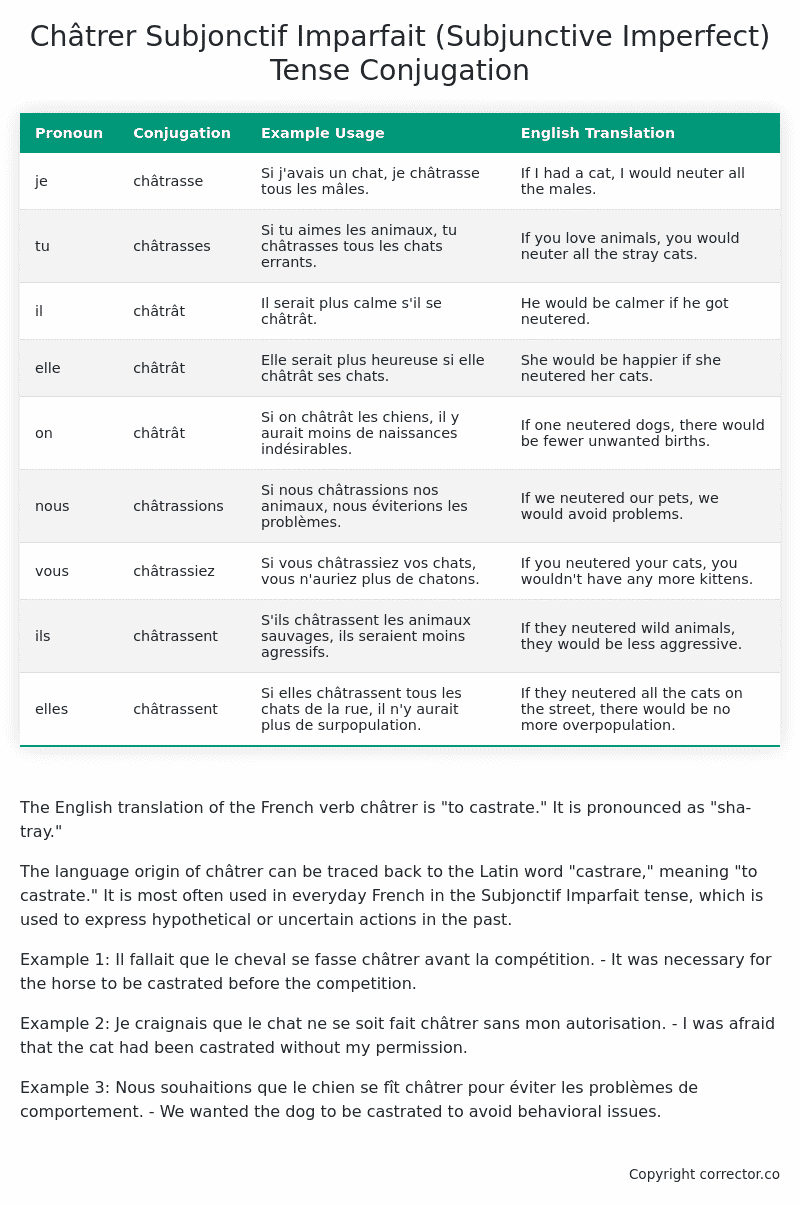Subjonctif Imparfait (Subjunctive Imperfect) Tense Conjugation of the French Verb châtrer
Introduction to the verb châtrer
The English translation of the French verb châtrer is “to castrate.” It is pronounced as “sha-tray.”
The language origin of châtrer can be traced back to the Latin word “castrare,” meaning “to castrate.” It is most often used in everyday French in the Subjonctif Imparfait tense, which is used to express hypothetical or uncertain actions in the past.
Example 1: Il fallait que le cheval se fasse châtrer avant la compétition. – It was necessary for the horse to be castrated before the competition.
Example 2: Je craignais que le chat ne se soit fait châtrer sans mon autorisation. – I was afraid that the cat had been castrated without my permission.
Example 3: Nous souhaitions que le chien se fît châtrer pour éviter les problèmes de comportement. – We wanted the dog to be castrated to avoid behavioral issues.
Table of the Subjonctif Imparfait (Subjunctive Imperfect) Tense Conjugation of châtrer
| Pronoun | Conjugation | Example Usage | English Translation |
|---|---|---|---|
| je | châtrasse | Si j’avais un chat, je châtrasse tous les mâles. | If I had a cat, I would neuter all the males. |
| tu | châtrasses | Si tu aimes les animaux, tu châtrasses tous les chats errants. | If you love animals, you would neuter all the stray cats. |
| il | châtrât | Il serait plus calme s’il se châtrât. | He would be calmer if he got neutered. |
| elle | châtrât | Elle serait plus heureuse si elle châtrât ses chats. | She would be happier if she neutered her cats. |
| on | châtrât | Si on châtrât les chiens, il y aurait moins de naissances indésirables. | If one neutered dogs, there would be fewer unwanted births. |
| nous | châtrassions | Si nous châtrassions nos animaux, nous éviterions les problèmes. | If we neutered our pets, we would avoid problems. |
| vous | châtrassiez | Si vous châtrassiez vos chats, vous n’auriez plus de chatons. | If you neutered your cats, you wouldn’t have any more kittens. |
| ils | châtrassent | S’ils châtrassent les animaux sauvages, ils seraient moins agressifs. | If they neutered wild animals, they would be less aggressive. |
| elles | châtrassent | Si elles châtrassent tous les chats de la rue, il n’y aurait plus de surpopulation. | If they neutered all the cats on the street, there would be no more overpopulation. |
Other Conjugations for Châtrer.
Le Present (Present Tense) Conjugation of the French Verb châtrer
Imparfait (Imperfect) Tense Conjugation of the French Verb châtrer
Passé Simple (Simple Past) Tense Conjugation of the French Verb châtrer
Passé Composé (Present Perfect) Tense Conjugation of the French Verb châtrer
Futur Simple (Simple Future) Tense Conjugation of the French Verb châtrer
Futur Proche (Near Future) Tense Conjugation of the French Verb châtrer
Plus-que-parfait (Pluperfect) Tense Conjugation of the French Verb châtrer
Passé Antérieur (Past Anterior) Tense Conjugation of the French Verb châtrer
Futur Antérieur (Future Anterior) Tense Conjugation of the French Verb châtrer
Subjonctif Présent (Subjunctive Present) Tense Conjugation of the French Verb châtrer
Subjonctif Passé (Subjunctive Past) Tense Conjugation of the French Verb châtrer
Subjonctif Imparfait (Subjunctive Imperfect) Tense Conjugation of the French Verb châtrer (this article)
Subjonctif Plus-que-parfait (Subjunctive Pluperfect) Tense Conjugation of the French Verb châtrer
Conditionnel Présent (Conditional Present) Tense Conjugation of the French Verb châtrer
Conditionnel Passé (Conditional Past) Tense Conjugation of the French Verb châtrer
L’impératif Présent (Imperative Present) Tense Conjugation of the French Verb châtrer
L’infinitif Présent (Infinitive Present) Tense Conjugation of the French Verb châtrer
Struggling with French verbs or the language in general? Why not use our free French Grammar Checker – no registration required!
Get a FREE Download Study Sheet of this Conjugation 🔥
Simply right click the image below, click “save image” and get your free reference for the châtrer Subjonctif Imparfait tense conjugation!

Châtrer – About the French Subjonctif Imparfait (Subjunctive Imperfect) Tense
Formation
Common Everyday Usage Patterns
Interactions with Other Tenses
Subjonctif Présent
Indicatif Passé Composé
Conditional
Conditional Perfect
Summary
I hope you enjoyed this article on the verb châtrer. Still in a learning mood? Check out another TOTALLY random French verb conjugation!


